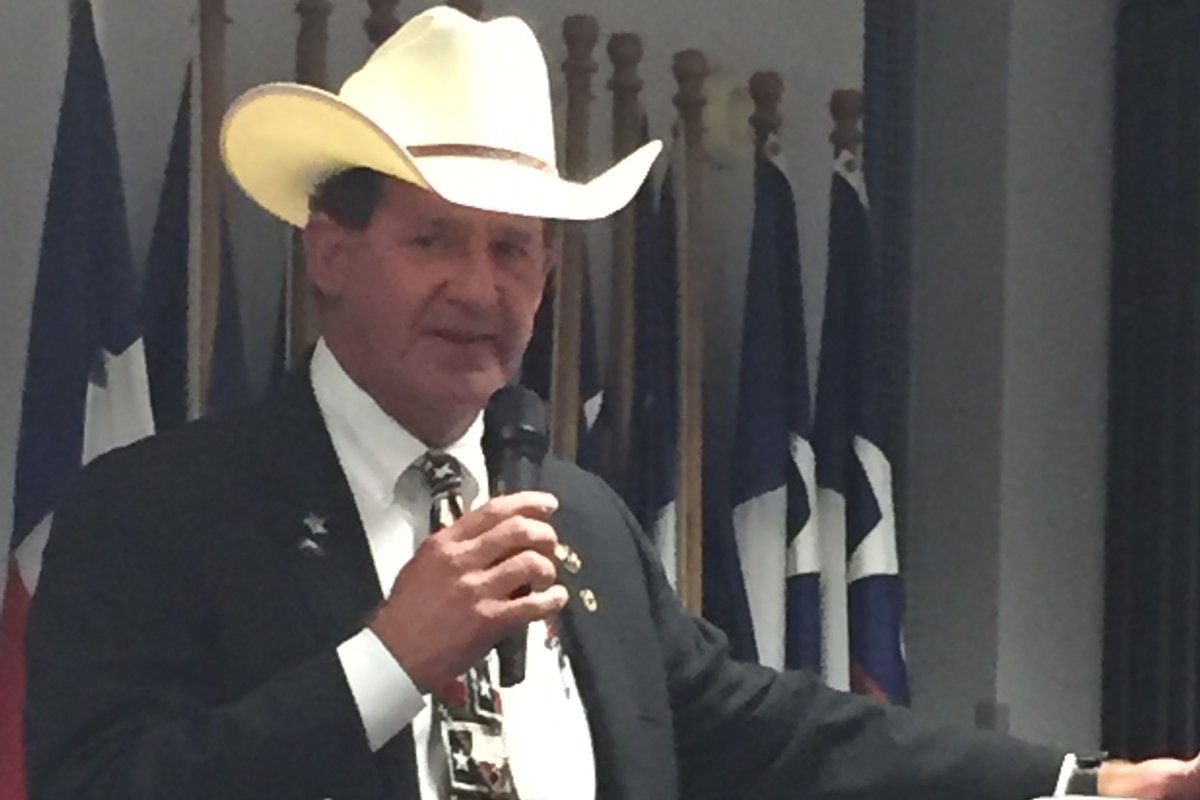
Later this month, federal agents will walk into a windowless, concrete room in the Jackson County jail in East Texas to install a fingerprint machine and a high-speed internet hookup. Once that's done, Jackson County correctional officers will be able to access federal databases to check whether the people they've arrested are undocumented immigrants—and call in the feds if they are.
'Wearing Two Hats'
The Jackson County sheriff applied last year to have his officers cross-designated as federal immigration enforcement officers through a little-known section of the Immigration and Nationality Act law known as 287(g). Late last month, President Trump signed an executive order that aims to revive and beef up the use of 287(g) and give many more local law enforcement agencies the power to act as immigration officers—a controversial move that reflects a larger and ongoing fight over immigration, sanctuary cities and America's southern border.
The day after Trump inked that executive order and another ordering construction of a border wall, Jackson County signed an agreement with Immigration and Customs Enforcement that authorized his officers to interrogate suspected undocumented immigrants, serve federal warrants for immigration violations and detain and transport undocumented immigrants.
"You're an agent of ICE, you're wearing two hats. You have an ICE booking station where suspected foreign-born would be fingerprinted," says Jackson County Sheriff A.J. "Andy" Louderback, who wears a white cowboy hat and carries a Colt .45 pistol. "Listen, if you run a correctional facility here in Texas then you should have 287(g)."

Trump called out the 287(g) program during an August speech at the Phoenix Convention Center that slammed then-President Obama, who scrapped agreements that deputized local law enforcement to do street-level immigration enforcement. Trump told the cheering crowd, "We will expand and revitalize the popular 287(g) partnerships, which will help to identify hundreds of thousands of deportable aliens in local jails that we don't even know about."
Louderback sides with Trump, at least when it comes to immigration enforcement in jails. (It's unclear whether Trump will bring back street enforcement of federal immigration laws by local law enforcement or if the partnerships will continue to be approved only for use in jails.) "I do not want to release criminal aliens into the community," Louderback tells Newsweek. "I don't think the prior administration believed that."
Another 13 counties near Jackson County, which lies 100 miles from Houston and 260 miles from the U.S.-Mexico border, have applied to follow it into a 287(g) partnership, says Louderback. He thinks having more counties onboard will help keep the entire region safe. "Each of us having a direct terminal to ICE ensures that any criminal aliens in adjoining counties wouldn't get out and move to Jackson County or vice versa."
287(g) Jurisdictions Expanding
Thirty-eight jurisdictions have the 287(g) designation, from the Massachusetts Department of Corrections to the Las Vegas Police Department. Experts expect that number to grow. "It's a certainty. They're coming back," says Jessica Vaughan, the director of policy studies at the Center for Immigration Studies.
The jails, prisons, sheriff's offices and police departments who win 287(g) designation obtain a wide range of authority and abilities, including access to ICE and Department of Homeland Security databases so they can quickly check names, fingerprints and photos in order to enforce immigration laws, an ICE official tells Newsweek. "The speed of information is critical," Louderback says, explaining that his office regularly released a criminal defendant on bond only to later receive an ICE detainer seeking to hold that person.
The local law enforcement officers also get, "the power and authority to interrogate any person detained in the participating law enforcement agency's detention center who the officer believes to be an alien about his or her right to be or remain in the United States," according to Jackson County's memorandum of agreement (MOA). (The memos for the 37 other jurisdictions that have 287(g) designation use the same language.) Armed with their 287(g) designation, the local officers also have the authority to charge any person arrested for state or local crimes with immigration violations and also to detain and transport that person to an ICE-approved detention facility.
"Additionally, the MOA grants the authority to fingerprint, photograph, interview and process aliens for ICE supervisory review," the ICE official said in an email. "With every person you have, you have access to their ICE case," says Louderback, who peppers "dang" and "brother" into his sentences. "It ensures that I don't release a criminal alien into Jackson County that should not be released."
Civil Rights Concerns
Critics of the 287(g) program, which was first implemented in Florida in 2002 under President George W. Bush, say its history is riddled with discrimination and that it's wrong for local law enforcement to carry out federal laws. "The experience we've had with this program is one of unmitigated civil rights violations and the erosion of public safety," Chris Newman, legal director of the National Day Laborer Organizing Network, tells Newsweek. "There's a tendency to Trumpify local law enforcement in a way that results in civil rights violations and discrimination and it ultimately hurts public safety because people become afraid to report crimes."
Newman cited the controversial reign of Maricopa County Sheriff Joe Arpaio in Arizona, who lost his 287(g) designation in 2011 because of a Justice Department report that accused his office of illegally targeting Latinos. He also believes the 287(g) program will expand under Trump. "I think we're going to go through another period where we'll see Joe Arpaios popping up around the country like mushrooms."

The expansion of the Delegation of Immigration Authority, as 287(g) is called, is just one of the many immigration issues that are sparking fights across the country. In addition to the nationwide protests and court battles over Trump's ban on refugees and travelers from seven Muslim-majority countries, last month San Francisco sued over Trump's executive order to defund "sanctuary cities," and New York City threatened a similar lawsuit.
Trump Pushes for More Partnerships
Earlier this month, the governor of Texas cut almost $2 million in funding to Travis County after the sheriff there announced she would limit her cooperation with ICE. Protesters in Arizona demonstrated for two nights in a row against the February 8 deportation of Phoenix mom Guadalupe Garcia de Rayos, in what her lawyer said may be the state's first deportation prompted by Trump's executive order. And the Los Angeles Times calculated that Trump's executive order on immigration—the same one that will expand 287(g)—could make 8 million undocumented immigrants a priority for deportation.
Other portions of the executive order also tightened the connection between local and federal law enforcement. The order reinstituted "Secure Communities," a program in which local law enforcement send the fingerprints of everyone they arrest on to ICE. The federal immigration agents can then check for people who are in the country illegally and issue a detainer so they have time to come and pick up the person and deport them.
Trump continued his push for more partnership between local cops and the feds in a speech at the Police Chiefs and Sheriffs Conference on February 8. "You know the illegals, you know 'em by their first names, you know 'em by their nicknames," he said, encouraging his audience of local law enforcement leaders to work closely with his DHS head. "Call Secretary [John] Kelly's representatives and we'll get them out of our country and bring them back where they came from."
That's surely what Louderback, back in Jackson County, wants to do. The sheriff oversees a staff of about 50 people, including 15 in the jail and 11 who patrol the streets and ranch roads in his corner of East Texas. He estimates his deputies arrest about a dozen "foreign-born inmates" each month who will now be checked for their immigration background. "This is the way the government should address criminal aliens in our state," he says. "This is what we should be doing. This is who we are."
Uncommon Knowledge
Newsweek is committed to challenging conventional wisdom and finding connections in the search for common ground.
Newsweek is committed to challenging conventional wisdom and finding connections in the search for common ground.
About the writer
Josh Saul is a senior writer at Newsweek reporting on crime and courts. He previously worked for the New York ... Read more
To read how Newsweek uses AI as a newsroom tool, Click here.








